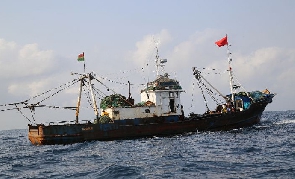- Home - News
- TWI News | TV
- Polls
- Year In Review
- News Archive
- Crime & Punishment
- Politics
- Regional
- Editorial
- Health
- Ghanaians Abroad
- Tabloid
- Africa
- Religion
- Election 2020
- Coronavirus
- News Videos | TV
- Photo Archives
- News Headlines
- Press Release
Opinions of Wednesday, 21 April 2021
Columnist: Steve Trent
False claims by some in the trawling industry are betraying Ghana and its fishing industry
The statement that approximately 90% of the Ghanaian trawl fleet is beneficially owned by Chinese corporations has prompted a backlash from some members of the Ghana Industrial Trawlers Association and others. It has been argued that on paper the licences for these trawlers are held by Ghanaian companies and they fly the Ghanaian flag, therefore this is legitimate business. This is false.
Indeed, the entire purpose of the study was to look behind these arrangements and uncover the beneficial ownership of the vessels in question. It aimed to disclose who is ultimately profiting from the activities of the vessels, and who is controlling them. We found that Chinese corporations are operating through front companies in Ghana, using them to register their vessels and obtain licences to fish.
They do this to circumvent the prohibition against foreign ownership in the industrial trawl sector under Section 47 of the 2002 Fisheries Act. This has resulted in a situation whereby Ghana now has the largest registry of Chinese distant water fishing vessels outside of China. These front companies list tiny revenues relative to the size of the fishing operations they claim to manage, strongly suggesting that the bulk of the profits flow to offshore entities based in China.
Some have argued that even if Chinese corporations do own the largest share in the vessels, it is simply a case of Ghanaian companies entering into hire purchase agreements with them because they are unable to afford to purchase the vessels outright. If that were the case, though, why are the Chinese entities maintaining such a strong influence over the vessels?
The Chinese corporations are involved in the export of catches from these vessels to China and other markets such as the European Union. They proudly announce that they have obtained licences to fish in Ghana on websites and in corporate reports. Even the Chinese Ministry of Agriculture has officially authorised them to run fishing operations in Ghana. These are not the actions of companies merely providing hire-purchase finance.
Other claims that have surfaced after publication of the report are also spurious and speak of a defensiveness born of self-interest. For instance, it is not relevant that the senior crew of these vessels are Chinese nationals (although it does again point to control by the Chinese), what we need to focus on is who is controlling the vessels and taking the profit.
At the moment, Ghana is missing out on between 14.4 -23.7 million US dollars every year in fishing licence fees and fines, it is standing by while rampant illegal fishing ¬– which has been linked to Chinese companies – is decimating fish populations, risking the livelihoods of over 2.7 million Ghanaians.
Achieving transparency is vital, so it is clear who is benefiting from fishing access, what and how much they are fishing, how much they are paying and what these funds are used for. Once ownership is clear, sanctions – that are severe enough to be truly deterrent ¬– must be enforced for any illegal fishing.
Ghana is a modern, highly capable and rightly proud democracy. It is a leading nation on the African continent and illegal practices by Chinese businesses in the vital seafood sector, putting food security and livelihoods of tens of thousands of Ghanaians at risk, should not be tolerated.
If His Excellency President Nana Akufo-Addo wants to leave a legacy that protects Ghana’s people, fisheries and food security, he will crackdown immediately on these practices.











